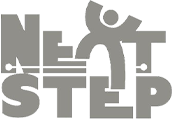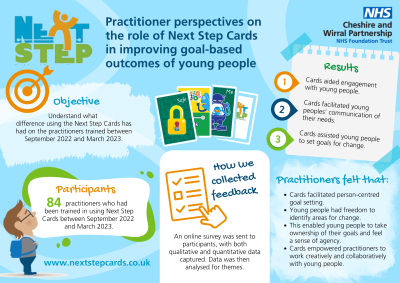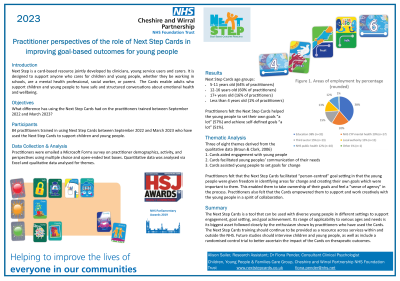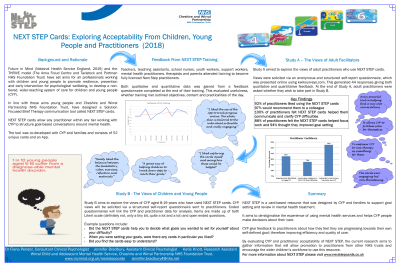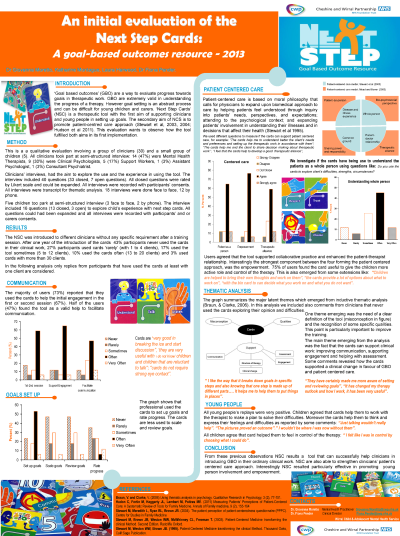The Next Step cards sit firmly within the “Coping” and “Thriving” quadrants of THRIVE.
The cards are an engagement tool that facilitate different ways of communicating about mental and emotional wellbeing. They build the confidence of adults working with young people to have conversations about emotional and mental wellbeing, especially when they do not have a mental health or counselling background.
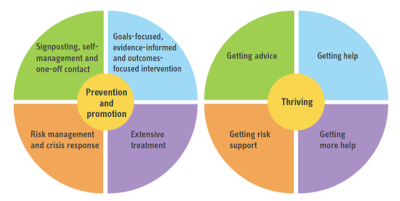
Our research found that young people carefully choose which adult in their environment they talk to about their emotional wellbeing. This might be a teaching assistant, a youth worker, a school nurse or a social worker. Young people told us that they often had the experience of adults in their environment telling them that they could not talk to them about mental or emotional wellbeing difficulties and passing them on to someone else.
The Next Step philosophy is that anyone can talk to young people about emotional and mental wellbeing, but sometimes adults need support to do this. The Next Step cards provides a framework for having these conversations with young people, building the confidence of adults working in children’s services, health and education.
The cards support professionals working with young people to identify their emotional wellbeing goals and support them to achieve these goals within a solution-focused framework. Another principle of Next Step is that young people are experts in themselves and already have skills that they can build upon to achieve their goals. With Next Step, the role of the professional is to facilitate the young person’s thinking and empower them to make their own decisions.
Though there are a range of outcome measurement tools available, GBOs are recommended by the CAMHS Outcome Research Consortium (CORC) and have an adaptability which enables them to be used:
- across a broad range of interventions
- in a variety of settings
- with a diverse range of service users
- flexibly to acknowledge different types of ‘change’.
In practice, GBOs follow a simple numbering scale of 0-10, to encourage a service user to consider where they feel they are and the progress they feel they are making towards achieving their goal during therapeutic work.
Reference: Wolpert, M., Harris, R., Jones, M., Hodges, S., Fuggle, P., James, R., Law, D. & Fonagy, P. (2014). THRIVE: The AFC-tavistock model for CAMHS. . London: CAMHS Press.
Cheshire and Wirral Partnership’s vision is to share innovative best practice, co-developed by professionals and young people, with the wider health and wellbeing community.
CWP believes that children and young people’s mental health is everyone’s business, and that all professionals who work with children and young people have valuable skills that can help. As part of the commitment to realising this vision, CWP, trained 189 delegates as Next Step practitioners from November 2021 to May 2022 during 12 training sessions.
The training evaluation report shares their quantitative and qualitative feedback on the training.
Cheshire & Wirral Partnership's vision is to share innovative best practice, co-developed by professionals and young people, with the wider health and wellbeing community. CWP believes that children and young people’s mental health is everyone’s business, and that all professionals who work with children and young people have valuable skills that can help. As part of the commitment to realising this vision, CWP trained 985 people as Next Step practitioners from September 2022 to June 2023 during 41 training sessions.
The training evaluation report shares their quantitative and qualitative feedback on the training.
Cheshire & Wirral Partnership's vision is to share innovative best practice, co-developed by professionals and young people, with the wider health and wellbeing community. CWP believes that children and young people's mental health is everyone's business, and that all practitioners who work with children and young people have valuable skills that can help. As part of the commitment to realising this vision, CWP trained 419 people as Next Step Cards practitioners from September 2023 to June 2024 during 23 training sessions.
The training evaluation report shares their quantitative and qualitative feedback on the training.
